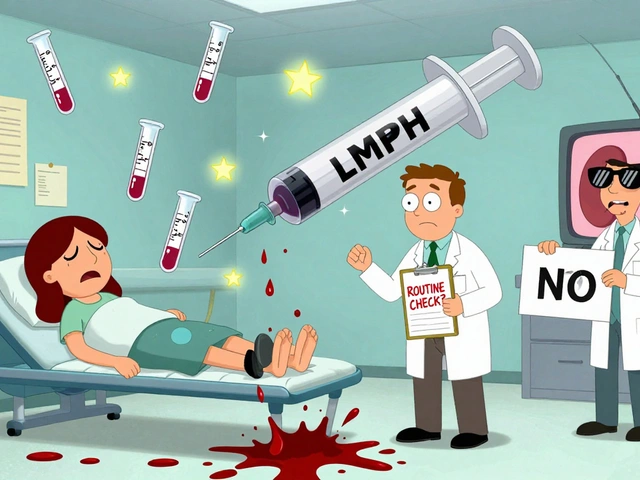If you’ve ever sat in a GP’s office stunned at your cholesterol numbers, you know there’s a sinking feeling in your gut. Statins are the big names everyone knows, but not everyone can take them. For some, the side effects are worse than the risk they’re meant to prevent. That’s where Zetia—or Ezetimibe, if we’re using the fancy name—sneaks onto the stage. Think of Zetia as statins’ quieter cousin who works differently, offering another shot at controlling stubborn cholesterol, especially when diet and statins alone just aren’t enough.
What Exactly Is Zetia and How Does It Work?
So here’s the deal: Zetia isn’t a statin. Unlike statins, which tell your liver to make less cholesterol, Zetia takes a different route. It actually blocks the stuff from being absorbed in your intestines. Basically, while you’re tucking into a full English or just enjoying some cheese, Zetia stands guard in your gut, stopping cholesterol from your food before it can sneak into your bloodstream. If you ever wondered why lowering cholesterol isn’t just about what you stop eating, Zetia is the reason—it literally keeps a chunk of what you do eat from becoming part of your blood chemistry.
Doctors have been prescribing Zetia since it got the green light in 2002 (US) and 2003 (Europe). Its main perk? It’s well-tolerated for people who get muscle aches or cramps from statins. It’s most often used alongside statins for an extra punch, but if you’re among the unlucky few who just can’t tolerate statins at all, some GPs use Zetia alone. According to a 2023 meta-analysis published in The Lancet, Ezetimibe lowers LDL (bad) cholesterol by roughly 18-25%—not quite as dramatic as the 30-60% some statins can manage, but still a decent punch.
If you’re a numbers person, the usual dose is 10mg once a day—easy to remember and easy to mix in with your usual daily meds. It has a half-life of about 22 hours, so missing an odd dose probably won’t mess things up, but you want your routine to stick for best results. Ezetimibe doesn’t care if you eat grapefruit in the morning either, which is brilliant for those who hate having to mess with their breakfast habits because of statins.

When Is Zetia the Right Call? Practical Tips, Dosage, and Risks
Now, let’s get real: Zetia isn’t magic. It works best when you’ve maxed out what diet, lifestyle changes, and statins can do—or if you can’t tolerate those statins. Here’s where to start if you and your doc are having the talk about broadening your cholesterol toolkit:
- Zetia is usually a second choice, added to your statin if you aren’t reaching your cholesterol goals.
- If you suffer from bad muscle aches, cramps, or even rare liver issues with statins, some GPs switch you over to Zetia or use it as a solo act.
- People with genetic cholesterol problems, like familial hypercholesterolemia (the stuff that runs in families and smacks you young), often do better with a combination of statins and Zetia.
The NHS is actually quite fond of Ezetimibe for those who can’t take statins. But here’s something most leaflets won’t tell you: the effect Ezetimibe has on heart attacks and strokes isn’t as dramatic as statins. In a big 2015 study called IMPROVE-IT, adding Zetia to simvastatin shaved off an extra 2% from the risk of heart attacks and strokes over seven years compared to statin alone. It’s not nothing, but it’s not knocking your risk in half either.
| Drug | Average LDL Cholesterol Lowering | Main Side Effects |
|---|---|---|
| Statins | 30-60% | Muscle aches, Rare liver effects |
| Zetia (Ezetimibe) | 18-25% | Mild stomach upset, Rare muscle/joint pain |
Let’s talk side effects. The honest truth? Most people do fine on Zetia. Some folks have mild gut grumbles—like stomach pain or a touch of diarrhoea. Rarely, some get headaches or joint aches. The big one people worry about (the muscle pain that plagues some statin users) is much less common, but it can happen. Liver enzymes can go up, but it’s rare—your GP will still probably check your blood numbers now and then. If you’re pregnant or breastfeeding, Zetia’s a no-no, and same deal if you have serious liver disease. If you’re a keen gym-goer or into marathon training, Zetia shouldn’t mess with your fitness plans, but anyone who feels persistent muscle pain or fatigue should flag it to their doctor.
And one more hot tip: always give updates to your GP about any vitamins or other medications you’re taking. Zetia doesn’t play badly with most common meds, but very high doses of certain immune suppressants (like cyclosporine) can sometimes hike up Ezetimibe levels in the blood. Your doctor will want to know about anything new in your medicine cabinet.

How to Get the Most Out of Zetia: Real World Scenarios, Costs, and Myths
If you’re starting Zetia—or thinking about it—it pays to know what to expect. It’s not a quick fix. You’ll usually have a cholesterol test after about three months to see what effect it’s having. For some, those first lab results feel a bit anticlimactic—18-25% lower LDL isn’t dazzling, but it can be the thing that turns a "high risk" result into something less scary. Don’t expect to feel different either; most people don’t notice being on Zetia, which actually isn’t a bad thing.
About the cost: in the UK, Zetia (Ezetimibe) is generic and available on the NHS for the usual prescription charge. If you’re in the US or somewhere Zetia isn’t covered, out-of-pocket can pinch, but generic versions have made a big difference since 2016. For context, back when it was brand-only, Zetia could run anywhere from £33 to over £80 for a month’s supply. Now, generics can cost under £10 a month in most places.
Some myths still swirl around Zetia. You might hear people claim it causes weight gain—there’s no proof it does. Others say you shouldn’t take it with food, but that’s wrong—your absorption’s the same with or without brekkie. There were also questions about it causing cancer years ago after one dodgy study, but big reviews have put that fear to bed.
The main tips for making Zetia work for you? Take it at the same time each day (morning tends to work well for most of us creatures of habit). Keep up your good habits—don’t use it as an excuse to ignore your diet or stop walking the dog every evening. Give your GP a heads-up if you notice anything weird, like unusual muscle pain, yellowing of your skin, or allergic reactions. And stay curious—cholesterol meds are always changing, and keeping an open conversation with your doctor (or pharmacist, who are usually easier to get hold of!) is the smartest way to make sure you’re actually getting the benefits you need.
Living in Bristol, I know plenty who’ve changed their life (and cholesterol numbers) thanks to the right meds—and Zetia gets the nod more than most people think. It doesn’t just help on its own; it gives options when statins don’t cut it or are too troublesome. If you’re stuck with high cholesterol despite trying your best, talk to your doctor about Zetia. It might not be flashy, but it’s one more weapon in your cholesterol-fighting arsenal.







Comments
dayana rincon
July 14, 2025 AT 08:24 AMSo Zetia’s just the cholesterol version of a bouncer at a club? 🤔 ‘Nope, cholesterol, you ain’t gettin’ in.’ I love that it doesn’t care about grapefruit. My smoothie lives. 🍊✨
Tiffany Fox
July 15, 2025 AT 17:56 PMMy dad’s been on it for 3 years. No muscle pain, no drama. Just a little pill that does its quiet job. Glad it exists.
Keith Avery
July 17, 2025 AT 16:39 PMLet’s be real - the IMPROVE-IT trial showed a 2% reduction in cardiovascular events over seven years. That’s statistically significant, sure, but clinically negligible. You’re paying for a marginal effect with a drug that’s been around since 2002. Meanwhile, PCSK9 inhibitors deliver 60% LDL reduction with proven mortality benefit. Zetia is a placeholder, not a solution.
Sean Goss
July 18, 2025 AT 14:45 PMUgh. Another ‘Zetia is fine’ post. The real issue is that pharma markets these drugs as ‘alternatives’ when they’re really just ‘statin-adjacent’ revenue streams. The 18-25% LDL reduction? That’s barely better than fish oil. And don’t get me started on the lack of hard endpoint data. This isn’t medicine - it’s pharmacological appeasement.
raja gopal
July 20, 2025 AT 04:55 AMI really appreciate how you broke this down. My uncle couldn’t tolerate statins at all - muscle pain so bad he couldn’t climb stairs. After switching to Zetia, he’s back to gardening every morning. It’s not flashy, but for some people? It’s life-changing. Thank you for sharing the real story.
Courtney Mintenko
July 21, 2025 AT 12:51 PMCholesterol is a social construct anyway
They made us fear the lipid
Now we worship pills
Who even are we anymore
Tressie Mitchell
July 21, 2025 AT 13:08 PMAs someone who actually reads the primary literature, I find it astonishing how casually Zetia is promoted as a viable monotherapy. The 2015 IMPROVE-IT trial demonstrated no significant reduction in all-cause mortality - only a marginal composite endpoint benefit. This is not a therapeutic breakthrough. It’s a regulatory compromise masquerading as innovation. If your LDL is still above 100 after Zetia, you’re not ‘managing’ risk - you’re delaying inevitable intervention.
Natalie Sofer
July 22, 2025 AT 23:40 PMJust wanted to say - if you're on Zetia and feeling weird, don't ignore it. I had a friend who thought 'mild stomach upset' was normal... turned out it was early liver issues. Always check in with your doc. You're worth it 💛
Khamaile Shakeer
July 24, 2025 AT 17:32 PMWait… so you’re telling me this $10/month pill doesn’t make me lose weight? 😭 I thought it was the new keto in a capsule… Also, why do all the studies say ‘no effect on mortality’ but the ads say ‘protect your heart’? 🤨
Cindy Burgess
July 25, 2025 AT 10:58 AMWhile the pharmacological mechanism of ezetimibe is well-characterized, its clinical utility remains constrained by the absence of robust, long-term, all-cause mortality benefit in randomized controlled trials. The modest LDL-lowering effect, while statistically significant, fails to demonstrate proportional cardiovascular risk reduction when compared with statins or newer agents such as PCSK9 inhibitors. Furthermore, the economic implications of widespread prescribing - particularly in the absence of clear patient-centered outcomes - warrant critical reappraisal by clinical guidelines.
John Kang
July 25, 2025 AT 13:03 PMYou got this. Even small wins matter. If Zetia helps you stay consistent and feel okay? That’s huge. Keep going. Your future self thanks you.
Rohini Paul
July 27, 2025 AT 10:03 AMMy mom’s on it. She says she forgets to take it sometimes but never feels sick. I asked her if it’s worth it and she said ‘Better than the muscle cramps from statins.’ So… maybe that’s the real metric? Not the % drop in LDL - but whether you can still walk to the mailbox without groaning.
Suryakant Godale
July 28, 2025 AT 22:12 PMIt is imperative to note that ezetimibe’s efficacy is contingent upon adherence to a low-cholesterol diet and regular physical activity. Pharmacological intervention without concomitant lifestyle modification yields suboptimal outcomes. The data from the IMPROVE-IT trial further suggests that the incremental benefit is most pronounced in high-risk populations with familial hypercholesterolemia. Therefore, patient stratification remains paramount in therapeutic decision-making.
Orion Rentals
July 29, 2025 AT 21:01 PMThank you for the comprehensive overview. I appreciate the inclusion of both clinical data and real-world considerations. This is precisely the kind of balanced, evidence-based perspective that is too often missing from public health discourse. Your mention of cost accessibility and generic availability is especially valuable for patients navigating complex healthcare systems.